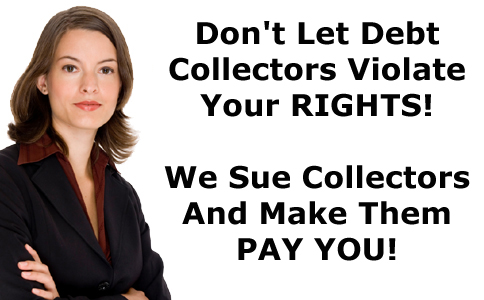How To Deal With Debt Collector Harassment
Debt collectors routinely violate the consumer protection laws that are in place that prohibit debt collection harassment and abuse. They routinely violate the laws because they know they will collect more money from consumers by doing so. Debt collectors also know that most consumers do not know or understand the laws that are in place to protect them, or believe if the consumer did know about these laws, that they lack the resources to fight back.
The Fair Debt Collection Practices Act (FDCPA) (15 U.S.C. §1692 et seq.) prohibits debt collectors from engaging in a wide range of abusive and harassing conduct. There are many things that a debt collector often does or fails to do that violate the FDCPA.
Here are some common FDCPA violations perpetrated by debt collectors:
- Contacting a debtor who is represented by an attorney.
- Failing to warn a debtor that the communication is from a debt collector and that any information obtained will be used to collect a debt.
- Failing to warn on all subsequent communications that they are from a debt collector.
- Calling the debtor an unreasonable number of times daily or after they have been instructed to stop calling.
- Using profane, foul, or obscene language.
- Making racial, religious, or sexual slurs.
- Yelling or screaming at the debtor.
- Engaging in name calling.
- Falsely threatening a lawsuit.
- Falsely threatening to ruin a debtor’s credit.
To see more FDCPA violation examples CLICK HERE
What Can I Do If I'm Being Harassed?
If you're being illegally harassed by a debt collector, you can get paid $1000.00 for statuary damages, and possibly more for actual damages. However, you will need to help the attorney prove your case by gathering evidence of the collection abuse.
If you want to sue a debt collector, you will need gather and organize all the information you can about the debt, as well as the collection efforts of any past or current collectors who contacted you. The past correspondence provides important information about the kinds of charges and interest that have been added to the debt.
If you have copies of your credit reports, you will need those also. The credit reports also contain historic information about the debt, including the time it was incurred, when it was defaulted, and who may have collected it previously.
If you have any notes about the debt or any taped conversations, threatening letters, or any communication whatsoever with the collector, these can be extremely valuable in reconstructing the collection efforts and any abuse.
Whenever you're contacted by a debt collector, you need to log the call and note the date, time, person who called and content of the call including any abusive language or threats. You should keep these notes together.
If you have any witnesses who can corroborate that you were abused, you should get a brief statement from that witness in their own words. These statements will help to refresh the witnesses' memories when you get to trial and provide information to your attorney.


